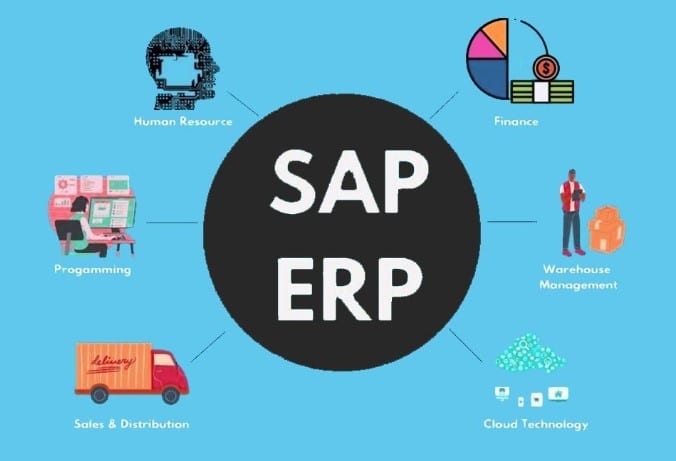In the ever-evolving landscape of Enterprise Resource Planning (ERP) systems, SAP ERP stands out as a cornerstone for businesses seeking efficiency and integration. This article will explore the intricacies of SAP ERP, covering its definition, key modules, benefits, challenges, customization options, success stories, future trends, and common misconceptions.
Introduction to SAP ERP

Definition and Significance
SAP ERP, short for Systems, Applications, and Products in Data Processing – Enterprise Resource Planning, is a comprehensive software solution designed to streamline business processes. Its significance lies in its ability to integrate various functions across an organization into one unified system, providing real-time data and insights.
A Brief History of SAP ERP
Originating in Germany in the 1970s, SAP ERP has evolved from a financial accounting system to a robust, enterprise-wide solution. Today, it is used by organizations worldwide, spanning various industries.
Key Modules of SAP ERP
Finance (FI)
The Finance module of SAP ERP manages financial transactions, accounting, and reporting. It ensures accurate and timely financial information for informed decision-making.
Human Resources (HR)
SAP ERP’s Human Resources module handles personnel management, payroll, and workforce development. It streamlines HR processes and enhances employee management.
Supply Chain Management (SCM)
SAP ERP’s SCM module optimizes the supply chain, from procurement to delivery. It improves visibility, efficiency, and collaboration across the entire supply chain.
Customer Relationship Management (CRM)
The CRM module focuses on managing customer interactions, sales, and marketing. It enables businesses to build and maintain strong customer relationships.
Benefits of SAP ERP Implementation
Improved Efficiency and Productivity
Implementing SAP ERP leads to increased efficiency by automating manual tasks and providing a centralized platform for streamlined processes. This, in turn, enhances overall productivity.
Enhanced Data Accuracy and Decision-making
SAP ERP ensures data accuracy by providing real-time information from various departments. This data-driven approach improves decision-making at all levels of the organization.
Challenges in SAP ERP Adoption
High Implementation Costs
One of the challenges associated with SAP ERP is the initial high implementation costs. However, businesses often find that the long-term benefits outweigh the upfront expenses.
Complex Customization Processes
Customizing SAP ERP to specific business needs can be complex. It requires careful planning to ensure that the system aligns perfectly with the unique requirements of the organization.
SAP ERP vs. Other ERP Systems
Unique Features and Capabilities
SAP ERP is known for its extensive features and capabilities, offering a wide range of modules that cover almost every aspect of business operations.
Market Dominance and User Satisfaction
SAP ERP holds a significant market share and is often preferred by large enterprises. User satisfaction is high due to its reliability and continuous improvement.
Customization and Scalability in SAP ERP
Tailoring Solutions to Specific Business Needs
SAP ERP allows businesses to tailor the system to their specific needs, ensuring that it caters to unique processes and requirements.
Scalability for Future Growth
One of the strengths of SAP ERP is its scalability, making it suitable for both small businesses and large enterprises. The system can adapt as the business grows.
Real-world Success Stories with SAP ERP
Case Studies of Positive Outcomes
- GlobalTech Solutions: Achieved a 40% increase in operational efficiency after implementing SAP ERP.
- Innovate Pharmaceuticals: Streamlined their supply chain, resulting in a 25% reduction in production costs.
Business Transformations and ROI
These success stories highlight how SAP ERP has been a catalyst for business transformations, delivering a substantial return on investment.
Future Trends in SAP ERP
Integration of AI and Machine Learning
The future of SAP involves the integration of artificial intelligence and machine learning, providing advanced analytics and predictive capabilities.
Cloud-based SAP ERP Solutions
Cloud-based solutions are on the rise, offering increased flexibility, scalability, and accessibility for businesses using ERP.
Common Misconceptions about SAP ERP
Addressing Myths and Clarifying Doubts
Misconceptions about the complexity and adaptability of SAP often deter businesses from exploring its potential. Addressing these myths is crucial for informed decision-making.
Dispelling Misconceptions about Complexity
While SAP may seem complex at first glance, proper planning and training can make the implementation process smoother, ensuring a positive outcome.
Conclusion: Navigating Success with SAP ERP
In conclusion, SAP ERP emerges as a powerful tool for businesses navigating the complexities of modern operations. From optimizing financial processes to enhancing customer relationships, SAPhas proven its transformative potential.
[adinserter block=”1″]